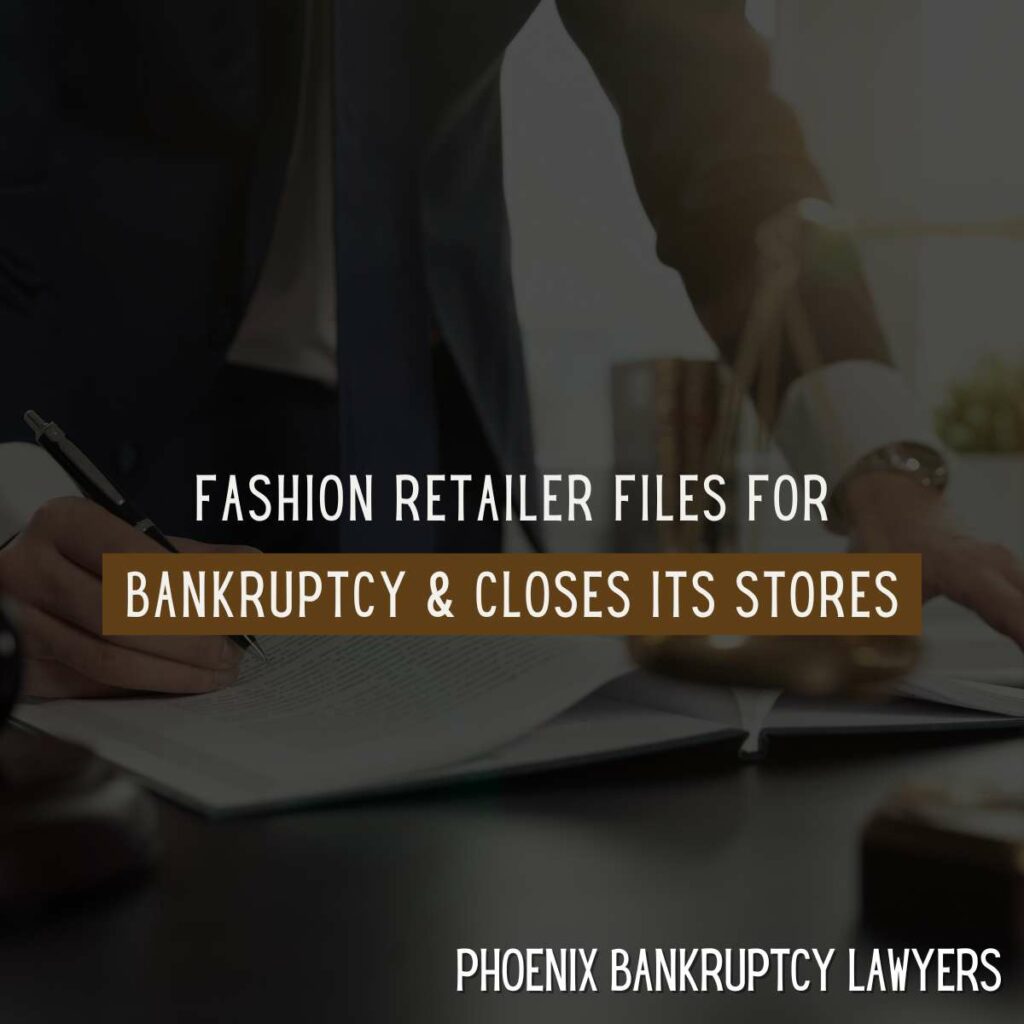It’s no secret that brick-and-mortar fashion retail is currently a tough market. More and more people turn to online shopping for the convenience and expanded variety. For many brands, store locations have become little more than places for online shoppers to return and exchange their purchases. With the declining popularity of the mall, it probably won’t surprise you to learn that yet another fashion store has filed its chapter 11 bankruptcy petition. Read on to learn more about the bankruptcy process, as well as similar bankruptcy cases that have been filed in the past. If you’re thinking about filing for bankruptcy in Arizona, our lawyers offer free consultations and flexible payment plans to fit your budget. To get started with your free consultation today, call 602-509-0955.
 Rue 21’s Chapter 11 Bankruptcy Case
Rue 21’s Chapter 11 Bankruptcy Case
Rue 21 is a popular fashion retailer geared towards younger shoppers. It has 543 store locations, including 7 in Arizona, which will all shut down for good as part of the bankruptcy process. This means that its 4,900 employees will need to find new jobs. Its website is currently non-operational, and they issued a statement that it is going out of business and everything must go from its stores. The company was not able to find a buyer and has $194.4 million in debt. This is Rue 21’s third bankruptcy case. Its first filing came in 2003. The second was in 2017- at the time, it had 1,000 locations, but was forced to close 400 of them in exchange for unloading $700 million in debt. Rue 21’s lenders invested an additional $25 million in the company in 2022, and currently own 80% of the company.
All of Rue 21’s merchandise is marked down 30-50%. They must clear all of their inventory as the company’s permanent shutdown is inevitable. The 7 Rue 21 locations in Arizona are as follows:
- Glendale: 6800 N. 95th Ave.
- Goodyear: 1400 N. Litchfield Rd.
- Mesa: 6555 E. Southern Ave.
- Phoenix: 7611 W. Thomas Rd.
- Prescott: 5613 E. State Rte. 69
- Surprise: 13375 W. Grand Ave.
- Tempe: 5000 S. Arizona Mills Circle
Other Fashion Retailer Bankruptcy Cases
Rue 21 isn’t the first fashion retailer to file for bankruptcy, and many of the names that have are still in business today.
- Forever 21: A staple in malls across America, this fashion chain declared chapter 11 bankruptcy in 2019. One thing that makes Forever 21’s bankruptcy stand out from the rest is that it occurred before the COVID-19 pandemic, which made it difficult for so many retailers to stay in business. It was facing increased competition from rival brands like H&M and Zara while at the same time burdened by giant stores, with some as large as 100,000 square feet. Another part of its bankruptcy plan was to reduce focus on less successful markets in Asia and Europe. With plenty of Forever 21 locations still open today, this case is considered an example of a successful bankruptcy filing in the fashion industry.
- Brooks Brothers: This men’s fashion chain is known for having provided suits to dozens of presidents throughout our country’s history. However, it was forced to declare chapter 11 bankruptcy after 202 years in business. The company blamed the pandemic for the filing and sought additional financing to keep the business running during the restructuring period.
- JC Penney: JC Penney is another fashion retailer that was ultimately pushed into bankruptcy by the pandemic. It was purchased for $1.75 billion through its chapter 11 case, which allowed 60,000 employees to keep their jobs. The company, which had been in business for more than 100 years, had about $4 billion in debt upon filing its bankruptcy petition. Its original bankruptcy plan was to close 153 locations over the course of 2 years to leave a total of about 600 locations.
- Lucky Brand: This jeans company is yet another fashion retailer that fell victim to COVID-19. It had more than 175 locations at the time, but is also known for being for sale in larger department stores. It was purchased by Simon Property Group and Authentic Brands Group for $140.1 million through its chapter 11 bankruptcy case.
- Neiman Marcus: This luxury department store was able to clear $4 billion in debt through its 2020 chapter 11 bankruptcy filing. It needed $750 million in exit financing to successfully execute the bankruptcy.
- David’s Bridal: This wedding retailer chain filed for bankruptcy a second time in 2023. Its previous bankruptcy filing came in 2018. It sought a buyer through its filing as it had been overwhelmed by the struggles to stay afloat in a post-pandemic market.
Chapter 11 Bankruptcy For Corporations
Chapter 11 bankruptcy can be used by both individuals and corporations. When an individual files for chapter 11 bankruptcy, they usually have considerable assets but also staggering debts- examples often include celebrities like Rudy Giuliani and 50 Cent. It is a popular choice among business debtors because it gives businesses a chance to stay open, restructure, and come out of the matter as a profitable company once more. When a debtor declares chapter 11 bankruptcy, its primary creditors are appointed to form a committee. The committee can approve or deny decisions that affect the business going forward, but the business will retain control of its daily operations.
Many businesses can skip the creditor committee process by filing a small business or subchapter V bankruptcy case. However, the business must have less than $7.5 million in debt to qualify for either of these provisions. Unfortunately, with several million dollars in debt, Rue 21 will not be eligible for the small business provisions of chapter 11 bankruptcy that allow debtors to bypass creating a creditor committee.
As previously stated, a business doesn’t have to close down when it files chapter 11 bankruptcy. There are several different options a business can use to emerge from a chapter 11 bankruptcy filing. One of the most common ways is to find financing to bridge the gap while the company implements new strategies. Some companies need to downsize, while others need to focus their efforts. An example of this would be a brick-and-mortar business that needs to go digital. A chapter 11 business can find a buyer for the entire company as a way to get out of bankruptcy. But a chapter 11 case doesn’t proceed in as set of a fashion as chapter 7 or chapter 13 bankruptcy, which are the two most popular forms of consumer bankruptcy. Chapter 7 bankruptcy liquidates debts, eliminating the debtor’s obligation to repay unsecured debts like credit cards, medical bills, certain back taxes, and more. Chapter 13 reorganizes debts into a payment plan that allows debtors to save secured assets from their creditors. For more information about qualifying for either form of consumer bankruptcy in Phoenix or Tucson, Arizona, call 602-509-0955 for your free consultation with our firm.
Are You Considering Your Own Bankruptcy Filing In Tucson Or Phoenix, Arizona?
Filing for bankruptcy can be a difficult and stressful ordeal, but it doesn’t have to be. A skilled bankruptcy attorney provides knowledge and security at each step in the bankruptcy process. Our experienced bankruptcy professionals can help you determine if chapter 7 or chapter 13 is a fit for your situation, if you qualify for our Zero Down post-filing payment plan option, and more. To get started today with your free consultation, call 602-509-0955. Contact us at Phoenix Bankruptcy Lawyers today!
Phoenix Bankruptcy Lawyers
668 N. 44th St. Set 320
Phoenix, Arizona 85008
Phone: (602) 509-0955
